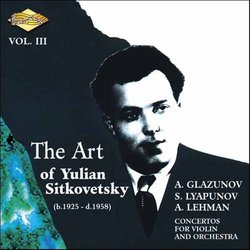| All Artists: Alexander Glazunov, Albert Lehman, Sergey Lyapunov, Alexei Kovaliev, Kiril Kondrashin, Sergey Gorchakov, Large USSR State Radio Symphony Orchestra, Moscow Symphony Orchestra, USSR Radio Symphony Orchestra Title: The Art of Yulian Sitkovetsky, Vol. 3 Members Wishing: 0 Total Copies: 0 Label: Artek Original Release Date: 1/1/2006 Re-Release Date: 5/16/2006 Genre: Classical Styles: Chamber Music, Forms & Genres, Concertos, Historical Periods, Classical (c.1770-1830), Modern, 20th, & 21st Century, Instruments, Strings Number of Discs: 1 SwapaCD Credits: 1 UPC: 661853002827 |
Search - Alexander Glazunov, Albert Lehman, Sergey Lyapunov :: The Art of Yulian Sitkovetsky, Vol. 3
 | Alexander Glazunov, Albert Lehman, Sergey Lyapunov The Art of Yulian Sitkovetsky, Vol. 3 Genre: Classical
|
Larger Image |
CD Details |
CD ReviewsThree Russian Violin Concertos Played by a Young Master J Scott Morrison | Middlebury VT, USA | 06/05/2006 (4 out of 5 stars) "The life story of Yulian Sitkovetsky is tragic. Born in 1925, he was dead of lung cancer at the age of 32. He had shared the gold medal of the Soviet Young Performers Competition in 1945 with Sviatoslav Richter and Mstislav Rostopovich and had he lived would surely have remained in such renowned company. He married pianist Bella Davidovich with whom he formed a notable duo; their son Dmitry Sitkovetsky followed in his father's footsteps and is now a renowned violin virtuoso, conductor and sometime composer.
Before he died he participated in landmark performances in the Soviet Union and its satellites of all the well-known romantic violin concerti. He also performed, as here, lesser-known concerti. The best known of the these is the Glazunov concerto, played here with smallish tone but laser-like intonation and with secure and knowing musicianship. If one is more familiar with the Perlman recording, one is in for a bit of a surprise as Sitkovetsky plays it in rather more classical style and it is none the worse for that approach. He is given sympathetic accompaniment by Kirill Kondrashin and the Moscow Symphony Orchestra, a recording made in mono (as all these recordings are) in 1952. Sound in this and the other concerti is of its time. Sergey Lyapunov is probably better known for his Transcendental Etudes for piano and for his two ultraromantic piano concerti, as well as his songs. The violin concerto (1915, rev. 1921) is also highly romantic and although Lyapunov was himself a pianist the concerti sounds quite violinistic. I'd never heard it before but was struck by the thematic content, seemingly influenced by Joachim's Hungarian concerto. There is some faux-orientalism that may have been picked up from his teacher, Balakirev. The USSR State Radio Symphony under Sergey Gorchakov has some intonational problems but Sitkovetsky's performance is worth hearing. The third of these concerti is by a composer I'd never heard of; the meager notes in this Artek release don't give us any information about the composers or the works. They only give Lehman's first initial -- A. -- which I learned from the Grove stands for Albert, although he does not have his own entry; I gleaned this from the 'Yulian Sitkovetsky' entry because they list the violinist as having given the première of this concerto. It is a strange but attractive work. It sounds for all the world as if it could have been written by a Chinese composer -- say, in the same realm as the 'Yellow River Concerto' that made a bit of a splash some years ago (although it is much more engaging, in my opinion) -- largely because it is largely pentatonic. The composer was born in 1915, much later than the other two composers here, but one wouldn't really know that from the music, really, as it is lushly romantic as well as somewhat linear. The orchestral accompaniment, again by the USSR State RSO this time under Alexey Kovalev, is a bit dim and not always precisely in synch. It is not clear what the source of these recordings is, although the latter two were probably recorded from broadcasts. There is a tiny note on the jewel box back cover indicating that the source recordings come from 'the Sitkovetsky Family Archives' and Dmitry Sitkovetsky is listed as co-producer of the CD and Bella Davidovich is given 'special thanks' along with some other family members. I was bowled over by the first CD in this series -- see my review -- but I missed the second one. This one, Vol. III, confirms my belief that Yulian Sitkovetsky was a major artist and again share my dismay that he was lost at such an early age. This one is for violin fanciers as well as those interested in somewhat out-of-the-way Russian violin concerti. I've given it four stars because of the dated sound and the somewhat iffy playing by the orchestras in the second and third concerti. Scott Morrison" |

 Track Listings (10) - Disc #1
Track Listings (10) - Disc #1